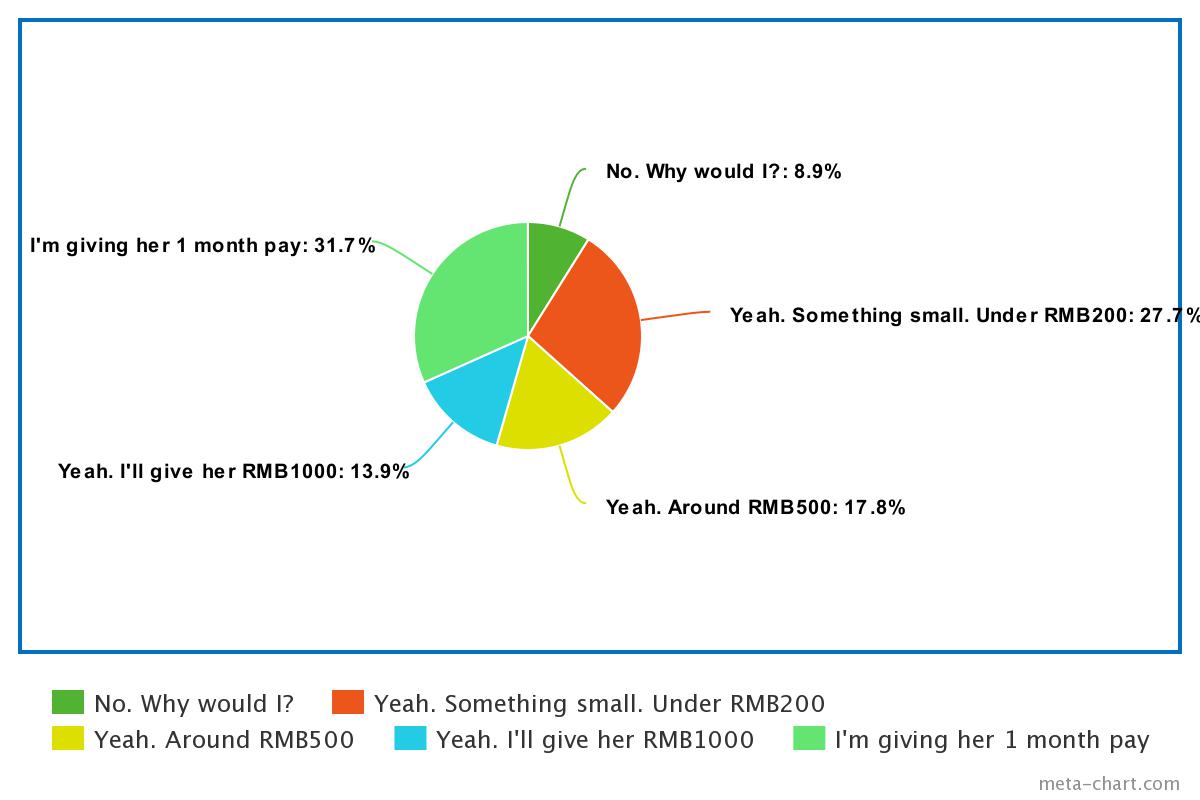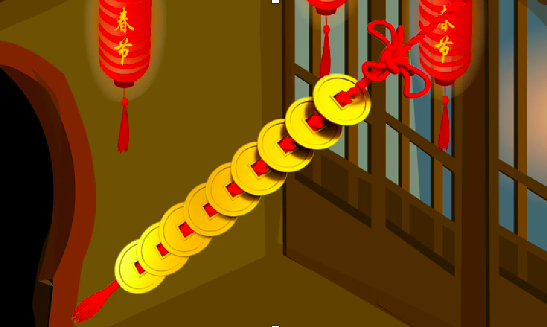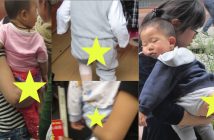Chinese New Year has arrived and that means it’s time to hand out 红包 hóngbāo! The little red packets can be seen next to check-out registers all over town. But who do you gift them to and how much do you put inside?
We took an informal poll on whether our readers will be giving ayi a hongbao during CNY. According to our readers, most of you will gift your ayi this CNY.
One mom on WeChat said, “We normally give a month’s salary + tea/nuts/fruit basket but we’ve been with our ayi for three years, otherwise just a hongbao is fine.”
In the previous years Jingkids has written extensively on how much to cash to stuff in hongbaos and to be quite frank, there’s no set number, only a ballpark figure.
I wanted to dig a little deeper into the traditions and customs surrounding hongbao so I reached out to the Beijing-based expat service provider MyPengYou, who provided a wealth of information. The history of the red packet dates all the way back to the Ming Dynasty when it was actually a series of coins strung across a red rope called 压岁钱 yāsuìqián. These were gifted to children as a way of keeping bad luck at bay over the coming year. However, the now-ubiquitous red envelope replaced the strings around the advent of the Republic of China, and the most modern incarnations are now delivered electronically via WeChat. With social distancing restrictions everywhere, WeChat hongbaos are the fastest and safest way to send some well wishes to your friends during CNY.

Over time, it has become customary to not only gift the children in your family but also anyone who provides a service throughout the year. So who can you give hongbaos to and are there rules to follow? Sort of. The same customs that have been around for generations still stand true today.
- If you’re a student and not working yet, your parents aren’t expecting a hongbao from you nor are your nieces or nephews. In some families, regardless of your age, students are still considered children and will still receive hongbaos from their elders.
- If you’re working, then children of your Chinese colleagues will be expecting hongbaos if you see them on Chinese New Year’s Eve, day, or if you’re invited to a celebration dinner. Bumping into them on the street doesn’t count. As a personal tip: always have a few extra hongbaos in your pocket when you attend gatherings during CNY. Some people might decide to bring their kids at the last minute and you don’t want a little kid to walk away hongbao-less and sad just because mom or dad forgot to RSVP them.
- If you’re married, you should definitely prepare a hongbao for your in-laws, but rather than coming to us for advice on how much to give, consult your spouse. They’ll know their family much better than us.
- Avoid giving amounts in 4’s (ie: RMB 4, RMB 400, RMB 4,000) because four sounds like “die” in Mandarin.
- Avoid giving amount in odd numbers because locals believe that good things come in pairs.
What about the people who provide you service all year round? MyPengYou stresses, “there’s no set or custom amount, you can give as much as you want.” But below are the common denominations that Chinese people gift staff.
- Full-time driver or ayi: RMB 800 to RMB 2,000
- Part-time driver or ayi: RMB 20 per visit during the festival period
- Gardener: RMB 100 per visit during the festival period
- Manicurist/Facialist: RMB 50 per visit during the festival period
- Massage Therapist: RMB 50 per visit during the festival period
In addition to hongbaos, it’s not uncommon to bring a host gifts of fruit nuts or tea if you’re invited to a CNY celebration by a local friend. According to topchinatravel.com, golden fruits such as oranges and tangerines are especially welcomed as they represent prosperity. This year, pomelos may be particularly appropriate since they represent a family reunion. Likewise, apples represent health and safety.
That’s the gifting side but what are the customs to observe if you or your child are offered a hongbao? Many of my local colleagues said that if your child is offered a hongbao by someone who the family knows well, and you as a parent believe it is intended as an act of goodwill and love, it is perfectly fine to accept it – just make sure your children show proper gratitude and respect by accepting it with both hands, giving a small bow and saying 謝謝 (xièxiè) thank you.
If your boss decides to gift you, it is expected that you will graciously accept in a similar way. But a warning about accepting hongbao if you are a teacher: This can be seen as a way of purchasing favor by some parents, so if you are offered a packet by a parent you should find a way to polity refuse. MyPengYou suggests a courteous, “It’s my pleasure to teach. I’m just doing my job.” Most school policies allow for accepting small gifts such as tea or fruit, but any extravagant gifts like jewelry or technology should also be refused.
Overall use your best judgment. In my opinion, If you can afford to gift your service providers generously it is always a good idea to do so. Especially considering the amount of comfort and help they offer us while we are so far from home. I don’t know about you but I’ve lost count of the times my ayi has gone out of her way to make my life a little easier. Making me a home-cooked meal, nursing a dying plant back to life, and even rearranging her work and family schedule to accommodate mine from time to time.
If someone in your life is making it easier for you to be here and enjoy this experience, take a moment to acknowledge their traditions and participate in their culture.
MyPengYou was particularly helpful in the writing of this article and if you need any services including ayis, drivers, gifting, moving, overseas movie streaming account, maintenance workers, or just about anything you can think of to make your daily life in Beijing a bit easier their English-speaking staff can assist you at the QR Code below.

KEEP READING: Kids Camps for CNY Holiday Fun!
Images: Canva, MyPengYou




